 Tìm kiếm
Tìm kiếm
Chương VII Luật tổ chức Toà án nhân dân 2014: Thẩm phán
| Số hiệu: | 62/2014/QH13 | Loại văn bản: | Luật |
| Nơi ban hành: | Quốc hội | Người ký: | Nguyễn Sinh Hùng |
| Ngày ban hành: | 24/11/2014 | Ngày hiệu lực: | 01/06/2015 |
| Ngày công báo: | 29/12/2014 | Số công báo: | Từ số 1167 đến số 1168 |
| Lĩnh vực: | Bộ máy hành chính | Tình trạng: | Còn hiệu lực |
TÓM TẮT VĂN BẢN
Sẽ có thêm Tòa án nhân dân cấp cao
Từ 01/06/2015, hệ thống tổ chức Tòa án nhân dân (TAND) sẽ có thêm TAND cấp cao, đây là điểm mới nổi bật trong Luật tổ chức TAND 2014.
Ngoài ra, còn có nhiều điểm mới khác, như là:
- Đưa vào Luật nội dung Thư ký Tòa án gồm các ngạch: thư ký viên, thư ký viên chính, thư ký viên cao cấp;
- Tương tự, Thẩm tra viên cũng được phân thành ba ngạch: thẩm tra viên, thẩm tra viên chính, thẩm tra viên cao cấp;
- Nhiệm kỳ đầu của thẩm phán là 05 năm; trường hợp được bổ nhiệm lại hoặc bổ nhiệm vào ngạch thẩm phán khác thì nhiệm kỳ tiếp theo là 10 năm;
- Ngạch thẩm phán gồm: Thẩm phán TAND tối cao, thẩm phán cao cấp, thẩm phán trung cấp, thẩm phán sơ cấp.
Luật này thay thế Luật tổ chức TAND 2002.
Văn bản tiếng việt
Văn bản tiếng anh
1. Thẩm phán Tòa án nhân dân gồm:
a) Thẩm phán Tòa án nhân dân tối cao;
b) Thẩm phán cao cấp;
c) Thẩm phán trung cấp;
d) Thẩm phán sơ cấp.
2. Tòa án nhân dân tối cao có Thẩm phán quy định tại điểm a khoản 1 Điều này.
3. Tòa án nhân dân cấp cao, Tòa án quân sự trung ương có Thẩm phán quy định tại điểm b khoản 1 Điều này.
4. Tòa án nhân dân tỉnh, thành phố trực thuộc trung ương, Tòa án quân sự quân khu và tương đương có Thẩm phán quy định tại các điểm b, c và d khoản 1 Điều này.
5. Tòa án nhân dân huyện, quận, thị xã, thành phố thuộc tỉnh và tương đương, Tòa án quân sự khu vực có Thẩm phán quy định tại điểm c và điểm d khoản 1 Điều này.
6. Số lượng Thẩm phán cao cấp, Thẩm phán trung cấp, Thẩm phán sơ cấp và tỷ lệ các ngạch Thẩm phán tại mỗi cấp Tòa án do Ủy ban thường vụ Quốc hội quyết định theo đề nghị của Chánh án Tòa án nhân dân tối cao.
1. Là công dân Việt Nam, trung thành với Tổ quốc và Hiến pháp nước Cộng hòa xã hội chủ nghĩa Việt Nam, có phẩm chất đạo đức tốt, có bản lĩnh chính trị vững vàng, có tinh thần dũng cảm và kiên quyết bảo vệ công lý, liêm khiết và trung thực.
2. Có trình độ cử nhân luật trở lên.
3. Đã được đào tạo nghiệp vụ xét xử.
4. Có thời gian làm công tác thực tiễn pháp luật.
5. Có sức khỏe bảo đảm hoàn thành nhiệm vụ được giao.
1. Người có đủ tiêu chuẩn tại Điều 67 của Luật này và có đủ các điều kiện sau đây thì có thể được tuyển chọn, bổ nhiệm làm Thẩm phán sơ cấp; nếu là sỹ quan quân đội tại ngũ thì có thể được tuyển chọn, bổ nhiệm làm Thẩm phán sơ cấp thuộc Tòa án quân sự:
a) Có thời gian làm công tác pháp luật từ 05 năm trở lên;
b) Có năng lực xét xử những vụ án và giải quyết những việc khác thuộc thẩm quyền của Tòa án theo quy định của luật tố tụng;
c) Đã trúng tuyển kỳ thi tuyển chọn Thẩm phán sơ cấp.
2. Người có đủ tiêu chuẩn tại Điều 67 của Luật này và có đủ các điều kiện sau đây thì có thể được tuyển chọn, bổ nhiệm làm Thẩm phán trung cấp; nếu là sỹ quan quân đội tại ngũ thì có thể được tuyển chọn, bổ nhiệm làm Thẩm phán trung cấp thuộc Tòa án quân sự.
a) Đã là Thẩm phán sơ cấp từ đủ 05 năm trở lên;
b) Có năng lực xét xử những vụ án và giải quyết những việc khác thuộc thẩm quyền của Tòa án theo quy định của luật tố tụng;
c) Đã trúng tuyển kỳ thi nâng ngạch Thẩm phán trung cấp.
3. Trường hợp do nhu cầu cán bộ của Tòa án nhân dân, người chưa là Thẩm phán sơ cấp có đủ tiêu chuẩn, điều kiện sau đây thì có thể được tuyển chọn, bổ nhiệm làm Thẩm phán trung cấp; nếu là sỹ quan quân đội tại ngũ thì có thể được tuyển chọn, bổ nhiệm làm Thẩm phán trung cấp thuộc Tòa án quân sự:
a) Có đủ tiêu chuẩn quy định tại các khoản 1, 2, 3 và 5 Điều 67 của Luật này;
b) Đã có thời gian làm công tác pháp luật từ 13 năm trở lên;
c) Có năng lực xét xử những vụ án và giải quyết những việc khác thuộc thẩm quyền của Tòa án theo quy định của luật tố tụng;
d) Đã trúng tuyển kỳ thi tuyển chọn vào ngạch Thẩm phán trung cấp.
4. Người có đủ tiêu chuẩn tại Điều 67 của Luật này và có đủ các điều kiện sau đây thi có thể được tuyển chọn, bổ nhiệm làm Thẩm phán cao cấp; nếu là sỹ quan quân đội tại ngũ thì có thể được tuyển chọn, bổ nhiệm làm Thẩm phán cao cấp thuộc Tòa án quân sự:
a) Đã là Thẩm phán trung cấp từ đủ 05 năm trở lên;
b) Có năng lực xét xử những vụ án và giải quyết những việc khác thuộc thẩm quyền của Tòa án cấp cao, của Tòa án quân sự trung ương theo quy định của luật tố tụng;
c) Đã trúng tuyển kỳ thi nâng ngạch Thẩm phán cao cấp.
5. Trường hợp do nhu cầu cán bộ của Tòa án nhân dân, người chưa là Thẩm phán trung cấp có đủ tiêu chuẩn, điều kiện sau đây thì có thể được tuyển chọn, bổ nhiệm làm Thẩm phán cao cấp; nếu là sỹ quan quân đội tại ngũ thì có thể được tuyển chọn, bổ nhiệm làm Thẩm phán cao cấp thuộc Tòa án quân sự:
a) Có đủ tiêu chuẩn quy định tại các khoản 1, 2, 3 và 5 Điều 67 của Luật này;
b) Đã có thời gian làm công tác pháp luật từ 18 năm trở lên;
c) Có năng lực xét xử những vụ án và giải quyết những việc khác thuộc thẩm quyền của Tòa án cấp cao, Tòa án quân sự trung ương theo quy định của luật tố tụng;
d) Đã trúng tuyển kỳ thi tuyển chọn vào ngạch Thẩm phán cao cấp.
6. Trong trường hợp đặc biệt, người được cơ quan, tổ chức có thẩm quyền điều động đến để đảm nhiệm chức vụ lãnh đạo Tòa án nhân dân cấp cao, Tòa án nhân dân tỉnh, thành phố trực thuộc trung ương, Tòa án nhân dân huyện, quận, thị xã, thành phố thuộc tỉnh và tương đương, tuy chưa đủ thời gian làm công tác pháp luật nhưng có đủ các tiêu chuẩn quy định tại Điều 67 của Luật này và điều kiện quy định tại điểm b khoản 1, điểm b khoản 2, điểm c khoản 3, điểm b khoản 4 Điều này thì có thể được tuyển chọn và bổ nhiệm làm Thẩm phán sơ cấp, Thẩm phán trung cấp, Thẩm phán cao cấp; nếu người đó là sĩ quan quân đội tại ngũ thì có thể được tuyển chọn và bổ nhiệm làm Thẩm phán sơ cấp, Thẩm phán trung cấp, Thẩm phán cao cấp các Tòa án quân sự.
1. Người có đủ tiêu chuẩn tại Điều 67 của Luật này và có đủ các điều kiện sau đây thì có thể được tuyển chọn, bổ nhiệm làm Thẩm phán Tòa án nhân dân tối cao:
a) Đã là Thẩm phán cao cấp từ đủ 05 năm trở lên;
b) Có năng lực xét xử những vụ án và giải quyết những việc khác thuộc thẩm quyền của Tòa án nhân dân tối cao theo quy định của luật tố tụng.
2. Người không công tác tại các Tòa án nhưng giữ chức vụ quan trọng trong các cơ quan, tổ chức trung ương, am hiểu sâu sắc về chính trị, pháp luật, kinh tế, văn hóa, xã hội, an ninh, quốc phòng, ngoại giao hoặc là những chuyên gia, nhà khoa học đầu ngành về pháp luật, giữ chức vụ quan trọng trong các cơ quan, tổ chức và có uy tín cao trong xã hội, có năng lực xét xử những vụ án và giải quyết những việc khác thuộc thẩm quyền của Tòa án nhân dân tối cao theo quy định của luật tố tụng thì có thể được tuyển chọn, bổ nhiệm làm Thẩm phán Tòa án nhân dân tối cao.
1. Hội đồng tuyển chọn, giám sát Thẩm phán quốc gia gồm Chánh án Tòa án nhân dân tối cao, 01 Phó Chánh án Tòa án nhân dân tối cao, Chánh án Tòa án quân sự trung ương, các Chánh án Tòa án nhân dân cấp cao, 01 đại diện lãnh đạo Ủy ban Trung ương Mặt trận Tổ quốc Việt Nam, Văn phòng Chủ tịch nước, Bộ Tư pháp, Bộ Quốc phòng, Ban chấp hành Trung ương Hội luật gia Việt Nam.
2. Chánh án Tòa án nhân dân tối cao là Chủ tịch Hội đồng tuyển chọn, giám sát Thẩm phán quốc gia.
3. Danh sách Ủy viên Hội đồng tuyển chọn, giám sát Thẩm phán quốc gia do Ủy ban thường vụ Quốc hội quyết định theo đề nghị của Chánh án Tòa án nhân dân tối cao.
4. Quy chế hoạt động của Hội đồng tuyển chọn, giám sát Thẩm phán quốc gia do Ủy ban thường vụ Quốc hội quy định theo đề nghị của Chánh án Tòa án nhân dân tối cao.
1. Xem xét tuyển chọn người đủ tiêu chuẩn, điều kiện làm Thẩm phán theo quy định của Luật này để đề nghị Chánh án Tòa án nhân dân tối cao:
a) Trình Quốc hội phê chuẩn đề nghị bổ nhiệm Thẩm phán Tòa án nhân dân tối cao;
b) Trình Chủ tịch nước quyết định bổ nhiệm Thẩm phán các Tòa án khác.
2. Xem xét việc miễn nhiệm, cách chức Thẩm phán theo quy định của Luật này để đề nghị Chánh án Tòa án nhân dân tối cao:
a) Trình Quốc hội phê chuẩn đề nghị miễn nhiệm, cách chức Thẩm phán Tòa án nhân dân tối cao;
b) Trình Chủ tịch nước quyết định miễn nhiệm, cách chức Thẩm phán các Tòa án khác.
3. Giám sát việc thực hiện nhiệm vụ, quyền hạn, đạo đức nghề nghiệp, quy tắc ứng xử, lối sống của Thẩm phán.
1. Chánh án Tòa án nhân dân tối cao trình Quốc hội phê chuẩn đề nghị bổ nhiệm Thẩm phán Tòa án nhân dân tối cao.
2. Hồ sơ trình Quốc hội phê chuẩn đề nghị bổ nhiệm Thẩm phán Tòa án nhân dân tối cao được gửi đến Ủy ban thường vụ Quốc hội để xem xét, đưa ra tại phiên họp gần nhất của Quốc hội.
3. Ủy ban Tư pháp của Quốc hội có trách nhiệm thẩm tra tờ trình Quốc hội phê chuẩn đề nghị bổ nhiệm Thẩm phán Tòa án nhân dân tối cao.
4. Quốc hội xem xét và ra Nghị quyết phê chuẩn đề nghị việc bổ nhiệm Thẩm phán Tòa án nhân dân tối cao.
5. Căn cứ Nghị quyết của Quốc hội, Chủ tịch nước ra quyết định bổ nhiệm Thẩm phán Tòa án nhân dân tối cao.
1. Hội đồng thi tuyển chọn Thẩm phán sơ cấp, Thẩm phán trung cấp, Thẩm phán cao cấp gồm Chánh án Tòa án nhân tối cao làm Chủ tịch; 01 Phó Chánh án Tòa án nhân dân tối cao, đại diện lãnh đạo Bộ Quốc phòng, Bộ Nội vụ là ủy viên.
Danh sách ủy viên Hội đồng thi tuyển chọn Thẩm phán sơ cấp, Thẩm phán trung cấp, Thẩm phán cao cấp do Chánh án Tòa án nhân dân tối cao quyết định.
2. Hội đồng thi tuyển chọn Thẩm phán sơ cấp, Thẩm phán trung cấp, Thẩm phán cao cấp có nhiệm vụ, quyền hạn sau đây:
a) Tổ chức kỳ thi tuyển chọn Thẩm phán sơ cấp;
b) Tổ chức kỳ thi nâng ngạch từ Thẩm phán sơ cấp lên Thẩm phán trung cấp, từ Thẩm phán trung cấp lên Thẩm phán cao cấp;
c) Tổ chức kỳ thi tuyển chọn vào ngạch Thẩm phán trung cấp, Thẩm phán cao cấp cho các trường hợp quy định tại khoản 3 và khoản 5 Điều 68 của Luật này;
d) Công bố danh sách những người trúng tuyển.
3. Quy chế hoạt động của Hội đồng thi tuyển chọn Thẩm phán sơ cấp, Thẩm phán trung cấp, Thẩm phán cao cấp, Quy chế thi tuyển chọn Thẩm phán sơ cấp, Thẩm phán trung cấp, Thẩm phán cao cấp do Chánh án Tòa án nhân dân tối cao quy định.
Nhiệm kỳ đầu của các Thẩm phán là 05 năm; trường hợp được bổ nhiệm lại hoặc được bổ nhiệm vào ngạch Thẩm phán khác thì nhiệm kỳ tiếp theo là 10 năm.
1. Nhà nước có chính sách ưu tiên về tiền lương, phụ cấp đối với Thẩm phán.
2. Thẩm phán được cấp trang phục, Giấy chứng minh Thẩm phán để làm nhiệm vụ.
3. Thẩm phán được bảo đảm tôn trọng danh dự, uy tín; được bảo vệ khi thi hành công vụ và trong trường hợp cần thiết.
4. Thẩm phán được đào tạo, bồi dưỡng để nâng cao trình độ và nghiệp vụ Tòa án.
5. Nghiêm cấm các hành vi cản trở, đe dọa, xâm phạm tính mạng, sức khỏe, danh dự, nhân phẩm của Thẩm phán và thân nhân của Thẩm phán.
6. Thẩm phán được tôn vinh và khen thưởng theo quy định của pháp luật về thi đua, khen thưởng.
7. Chế độ tiền lương, phụ cấp; mẫu trang phục, cấp phát và sử dụng trang phục, Giấy chứng minh Thẩm phán do Ủy ban thường vụ Quốc hội quy định theo đề nghị của Chánh án Tòa án nhân dân tối cao.
1. Trung thành với Tổ quốc, gương mẫu chấp hành Hiến pháp và pháp luật.
2. Tôn trọng nhân dân, tận tụy phục vụ nhân dân, liên hệ chặt chẽ với nhân dân, lắng nghe ý kiến và chịu sự giám sát của nhân dân.
3. Độc lập, vô tư, khách quan, bảo vệ công lý trong xét xử; chấp hành quy tắc ứng xử, đạo đức nghề nghiệp Thẩm phán, giữ gìn uy tín của Tòa án.
4. Giữ bí mật nhà nước và bí mật công tác theo quy định của pháp luật.
5. Học tập, nghiên cứu để nâng cao kiến thức, trình độ chính trị và chuyên môn nghiệp vụ Tòa án.
6. Chịu trách nhiệm trước pháp luật về việc thực hiện nhiệm vụ, quyền hạn và các quyết định của mình; nếu có hành vi vi phạm pháp luật thì tùy theo tính chất, mức độ vi phạm mà bị xử lý kỷ luật hoặc truy cứu trách nhiệm hình sự theo quy định của luật. Thẩm phán trong khi thực hiện nhiệm vụ, quyền hạn của mình mà gây thiệt hại thì Tòa án nơi Thẩm phán thực hiện nhiệm vụ xét xử có trách nhiệm bồi thường và Thẩm phán đã gây thiệt hại có trách nhiệm bồi hoàn cho Tòa án theo quy định của luật.
1. Những việc pháp luật quy định cán bộ, công chức không được làm.
2. Tư vấn cho bị can, bị cáo, đương sự hoặc người tham gia tố tụng khác làm cho việc giải quyết vụ án hoặc những việc khác không đúng quy định của pháp luật.
3. Can thiệp trái pháp luật vào việc giải quyết vụ án hoặc lợi dụng ảnh hưởng của mình tác động đến người có trách nhiệm giải quyết vụ án.
4. Đem hồ sơ vụ án hoặc tài liệu trong hồ sơ vụ án ra khỏi cơ quan, nếu không vì nhiệm vụ được giao hoặc không được sự đồng ý của người có thẩm quyền.
5. Tiếp bị cáo, đương sự hoặc người tham gia tố tụng khác trong vụ án mà mình có thẩm quyền giải quyết không đúng nơi quy định.
1. Việc điều động Thẩm phán được thực hiện để bảo đảm cho các Tòa án thực hiện nhiệm vụ xét xử.
2. Chánh án Tòa án nhân dân tối cao quyết định điều động Thẩm phán từ Tòa án nhân dân này đến làm nhiệm vụ tại Tòa án nhân dân khác không cùng phạm vi thẩm quyền theo lãnh thổ hoặc không cùng một tỉnh, thành phố trực thuộc trung ương.
3. Chánh án Tòa án nhân dân tỉnh, thành phố trực thuộc trung ương quyết định điều động Thẩm phán từ Tòa án nhân dân này đến làm nhiệm vụ tại Tòa án nhân dân khác trong phạm vi thẩm quyền theo lãnh thổ.
4. Bộ trưởng Bộ Quốc phòng quyết định điều động Thẩm phán từ Tòa án quân sự này đến làm nhiệm vụ tại Tòa án quân sự khác sau khi thống nhất với Chánh án Tòa án nhân dân tối cao.
1. Việc luân chuyển Thẩm phán giữ chức vụ lãnh đạo, quản lý Tòa án được thực hiện để phục vụ yêu cầu nhiệm vụ, quy hoạch cán bộ.
2. Chánh án Tòa án nhân dân tối cao quyết định luân chuyển Thẩm phán từ Tòa án nhân dân này đến làm nhiệm vụ tại Tòa án nhân dân khác không cùng phạm vi thẩm quyền theo lãnh thổ hoặc không cùng một tỉnh, thành phố trực thuộc trung ương.
3. Chánh án Tòa án nhân dân tỉnh, thành phố trực thuộc trung ương quyết định luân chuyển Thẩm phán từ Tòa án nhân dân này đến làm nhiệm vụ tại Tòa án nhân dân khác trong phạm vi thẩm quyền theo lãnh thổ.
4. Bộ trưởng Bộ Quốc phòng quyết định luân chuyển Thẩm phán từ Tòa án quân sự này đến làm nhiệm vụ tại Tòa án quân sự khác sau khi thống nhất với Chánh án Tòa án nhân dân tối cao.
1. Việc biệt phái Thẩm phán được thực hiện để bảo đảm cho các Tòa án thực hiện chức năng, nhiệm vụ xét xử.
2. Chánh án Tòa án nhân dân tối cao quyết định biệt phái Thẩm phán từ Tòa án nhân dân này đến làm nhiệm vụ có thời hạn tại Tòa án nhân dân khác không cùng phạm vi thẩm quyền theo lãnh thổ hoặc không cùng một tỉnh, thành phố trực thuộc trung ương.
3. Chánh án Tòa án nhân dân tỉnh, thành phố trực thuộc trung ương quyết định biệt phái Thẩm phán từ Tòa án nhân dân này đến làm nhiệm vụ có thời hạn tại Tòa án nhân dân khác trong phạm vi thẩm quyền theo lãnh thổ.
4. Bộ trưởng Bộ Quốc phòng quyết định biệt phái Thẩm phán từ Tòa án quân sự này đến làm nhiệm vụ có thời hạn tại Tòa án quân sự khác.
5. Thời hạn biệt phái Thẩm phán quy định tại các khoản 2, 3 và 4 Điều này không quá 03 năm.
1. Thẩm phán đương nhiên được miễn nhiệm khi nghỉ hưu, thôi việc, chuyển công tác khác.
2. Thẩm phán có thể được miễn nhiệm do sức khỏe, do hoàn cảnh gia đình hoặc vì lý do khác mà xét thấy không thể bảo đảm hoàn thành nhiệm vụ được giao.
1. Thẩm phán đương nhiên bị cách chức khi bị kết tội bằng bản án của Tòa án đã có hiệu lực pháp luật.
2. Tùy theo tính chất, mức độ vi phạm, Thẩm phán có thể bị cách chức khi thuộc một trong các trường hợp sau đây:
a) Vi phạm trong công tác xét xử, giải quyết những việc thuộc thẩm quyền của Tòa án;
b) Vi phạm quy định tại Điều 77 của Luật này;
c) Vi phạm về phẩm chất đạo đức;
d) Vi phạm quy tắc ứng xử, đạo đức nghề nghiệp Thẩm phán;
đ) Có hành vi vi phạm pháp luật khác.
1. Hội đồng tuyển chọn, giám sát Thẩm phán quốc gia xem xét những trường hợp miễn nhiệm, cách chức Thẩm phán theo đề nghị của Chánh án Tòa án nhân dân tối cao.
2. Việc phê chuẩn, miễn nhiệm, cách chức Thẩm phán Tòa án nhân dân tối cao thực hiện theo quy định tại Điều 72 của Luật này.
3. Theo đề nghị của Hội đồng tuyển chọn, giám sát Thẩm phán quốc gia, Chánh án Tòa án nhân dân tối cao trình Chủ tịch nước quyết định miễn nhiệm, cách chức Thẩm phán các Tòa án khác.
Chapter VII
JUDGES
Article 65. Duties and powers of judges
1. Judges are persons who fully meet the conditions and criteria prescribed by this Law and appointed by the President to perform the adjudicating duty.
2. Judges shall perform the duties and exercise the powers prescribed in Article 2 of this Law and relevant laws.
Article 66. Judge ranks
1. Judges of people’s courts include:
a/ Judges of the Supreme People’s Court;
b/ High-level judges;
c/ Intermediate-level judges;
d/ Primary-level judges.
2. The Supreme People’s Court has judges mentioned at Point a, Clause 1 of this Article.
3. The Supreme People’s Court and Central Military Court have judges mentioned at Point b, Clause 1 of this Article.
4. People’s courts of provinces and centrally run cities and military courts of military zones and the equivalent have judges mentioned at Points b, c and d, Clause 1 of this Article.
5. People’s courts of rural districts, urban districts, towns, provincial cities and the equivalent and regional military courts have judges mentioned at Points c and d, Clause 1 of this Article.
6. The numbers of high-level judges, intermediate-level and primary-level judges and proportions of judge ranks at each court level shall be decided by the National Assembly Standing Committee at the proposal of the Chief Justice of the Supreme People’s Court.
Article 67. Judge criteria
1. Being a Vietnamese citizen who is loyal to the Fatherland and the Constitution of the Socialist Republic of Vietnam, has good ethical qualities, firm political stance, courage and resolve to safeguard justice, and is incorrupt and honest.
2. Possessing a bachelor or higher degree in law.
3. Having been professionally trained in adjudication.
4. Having been engaged in practical legal work for a certain period of time.
5. Being physically fit to fulfill assigned duties.
Article 68. Conditions for appointment of primary-level judges, intermediate-level judges and high-level judges
1. A person who fully meets the criteria prescribed in Article 67 of this Law and the following conditions may be selected and appointed as a primary-level judge; if being an in-service army officer, he/she may be selected and appointed as a primary-level judge of a military court:
a/ Having been engaged in legal work for at least 5 years;
b/ Being capable of adjudicating cases and settling other matters under the jurisdiction of his/her court prescribed by the procedural law;
c/ Having passed a primary-level judge selection examination.
2. A person who fully meets the criteria prescribed in Article 67 of this Law and the following conditions may be selected and appointed as an intermediate-level judge; if being an in-service army officer, he/she may be selected and appointed as an intermediate-level judge of a military court:
a/ Having worked as a primary-level judge for at least 5 full years;
b/ Being capable of adjudicating cases and settling other matters under the jurisdiction of his/her court prescribed by the procedural law;
c/ Having passed an examination for judge promotion to intermediate level.
3. In case due to the personnel demand of a people’s court, a person who has not yet attained the primary-level judge rank but fully meets the following criteria and conditions may be selected and appointed as an intermediate-level judge; if being an in-service army officer, he/she may be selected and appointed as an intermediate-level judge of a military court:
a/ Meeting the criteria prescribed in Clauses 1, 2, 3 and 5, Article 67 of this Law;
b/ Having been engaged in legal work for at least 13 years;
c/ Being capable of adjudicating cases and settling other matters under the jurisdiction of his/her court prescribed by the procedural law;
d/ Having passed an intermediate-level judge selection examination.
4. A person who fully meets the criteria prescribed in Article 67 of this Law and the following conditions may be selected and appointed as a high-level judge; if being an in-service army officer, he/she may be selected and appointed as a high-level judge of a military court:
a/ Having worked as an intermediate-level judge for at least 5 full years;
b/ Being capable of adjudicating cases and settling other matters under the jurisdiction of superior courts or the Central Military Court prescribed by the procedural law;
c/ Having passed an examination for judge promotion to high-level rank.
5. In case due to the personnel demand of a people’s court, a person who has not yet attained the intermediate-level judge rank but fully meets the following criteria and conditions may be selected and appointed as a high-level judge; if being an in-service army officer, he/she may be selected and appointed as a high-level judge of a military court:
a/ Meeting the criteria prescribed in Clauses 1, 2, 3 and 5, Article 67 of this Law;
b/ Having been engaged in legal work for at least 18 years;
c/ Being capable of adjudicating cases and settling other matters under the jurisdiction of superior courts or the Central Military Court prescribed by the procedural law;
d/ Having passed a high-level judge selection examination.
6. In special cases, persons who are transferred by competent agencies or organizations to hold leading positions in superior people’s courts or people’s courts of provinces, centrally run cities, rural districts, urban districts, towns, provincial cities or the equivalent and folly meet the criteria prescribed in Article 67 of this Law and the conditions prescribed at Point b, Clause 1; Point b, Clause 2; Point c, Clause 3; and Point b, Clause 4 of this Article though having not yet been engaged in legal work for the prescribed period of time may be selected and appointed as primary-level, intermediate-level or high-level judges. If these persons are in-service army officers, they may be selected and appointed as primary-level, intermediate- level or high-level judges of military courts.
Article 69. Conditions for appointment as judges of the Supreme People’s Court
1. A person who folly meets the criteria prescribed in Article 67 of this Law and the following conditions may be selected and appointed as a judge of the Supreme People’s Court:
a/ Having worked as a high-level judge for at least 5 full years;
b/ Being capable of adjudicating cases and settling other matters under the jurisdiction of the Supreme People’s Court prescribed by the procedural law.
2. Persons who do not work in courts but hold important positions in central agencies or organizations, are deeply knowledgeable about politics, law, economics, culture, society, security, national defense and diplomacy or leading legal experts or scientists, hold important positions in agencies or organizations, have high reputation in society, and are capable of adjudicating cases and settling other matters under the jurisdiction of the Supreme People’s Court prescribed by the procedural law may be selected and appointed as judges of the Supreme People’s Court.
Article 70. The National Council for Judge Selection and Supervision
1. The National Council for Judge Selection and Supervision shall be composed of the Chief Justice of the Supreme People’s Court, one Deputy Chief Justice of the Supreme People’s Court, the Chief Justice of the Central Military Court, judges of superior people’s courts, representatives of the leaderships of the Central Committee of the Vietnam Fatherland Front, the President Office, the Ministry of Justice, the Ministry of National Defense and the Central Committee of the Vietnam Lawyers’ Association, one representative from each agency or organization.
2. The Chief Justice of the Supreme People’s Court shall act the Chairperson of the National Council for Judge Selection and Supervision.
3. The list of members of the National Council for Judge Selection and Supervision shall be decided by the National Assembly Standing Committee at the proposal of the Chief Justice of the Supreme People’s Court.
4. The operation regulation of the National Council for Judge Selection and Supervision shall be set out by the National Assembly Standing Committee at the proposal of the Chief Justice of the Supreme People’s Court.
Article 71. Duties and powers of the National Council for judge Selection and Supervision
1. To consider and select persons who fully meet the criteria and conditions prescribed by this Law to act as judges before proposing the Chief Justice of the Supreme People’s Court to:
a/ Submit to the National Assembly for approval proposals for appointment of judges of the Supreme People’s Court;
b/ Submit to the President for decision the appointment of judges of other courts.
2. To consider the relief from duty or dismissal of judges under this Law before proposing the Chief Justice of the Supreme People’s Court to:
a/ Submit to the National Assembly for approval proposals for relief from duty or dismissal of judges of the Supreme People’s Court;
b/ Submit to the President for decision the relief from duty or dismissal of judges of other courts.
3. To supervise the performance of duties, exercise of powers and observance of the professional ethics and code of conduct by judges and their lifestyle.
Article 72. Procedures for approval and appointment of judges of the Supreme People’s Court
1. The Chief Justice of the Supreme People’s Court shall submit to the National Assembly for approval his/her proposals for appointment of judges of the Supreme People’s Court.
2. Dossiers to be submitted to the National Assembly for approval of proposals for appointment of judges of the Supreme People’s Court shall be sent to the National Assembly Standing Committee for examination before being presented at the nearest session of the National Assembly.
3. The Judiciary Committee of the National Assembly shall examine submitted dossiers for the National Assembly’s approval of proposals for appointment of judges of the Supreme People’s Court.
4. The National Assembly shall consider and issue resolutions to approve proposals for appointment of judges of the Supreme People’s Court.
5. Pursuant to resolutions of the National Assembly, the President shall issue decisions to appoint judges of the Supreme People’s Court.
Article 73. The Examination Council for Selection of Primary-Level Judges, Intermediate-Level Judges and High-Level Judges
1. The Examination Council for Selection of Primary-Level Judges, Intermediate-Level Judges and High-Level Judges shall be composed of the Chief Justice of the Supreme People’s Court as its chairperson, and one Deputy Chief Justice of the Supreme People’s Court and representatives of the leaderships of the Ministry of National Defense and Ministry of Home Affairs as its members.
The list of members of the Examination Council for Selection of Primary-Level Judges, Intermediate-Level Judges and High-Level Judges shall be decided by the Chief Justice of the Supreme People’s Court.
2. The Examination Council for Selection of Primary-Level Judges, Intermediate-Level Judges and High-Level Judges has the following duties and powers:
a/ To organize examinations for selection of primary-level judges;
b/ To organize examinations for judge rank promotion from primary level to intermediate level or from intermediate level to high level;
c/ To organize examinations for selection of intermediate-level judges or high-level judges in the cases prescribed in Clauses 3 and 5, Article 68 of this Law;
d/ To announce lists of persons who pass examinations.
3. The operation regulation of the Examination Council for Selection of Primary-Level Judges, Intermediate-Level Judges and High-Level Judges and the regulation on examinations for selection of primary-level judges, intermediate-level judges and high-level judges shall be set out by the Chief Justice of the Supreme People’s Court.
Article 74. Term of office of judges
The initial term of office of judges is 5 years. For judges who are reappointed or appointed to another judge rank, the subsequent term of office is 10 years.
Article 75. Entitlements and policies toward judges
1. The State shall adopt preferential policies on salaries and allowances for judges.
2. Judges shall be provided with formal attires and judge identity cards to perform their duties.
3. The honor and prestige of judges shall be respected; and judges shall be protected while performing official duties and in case of necessity.
4. Judges shall be trained and retrained to improve their professional qualifications and court skills.
5. All acts of obstructing, intimidating, infringing upon lives or health, offending the honor or dignity of judges and their relatives are strictly prohibited.
6. Judges shall be honored, commended and rewarded in accordance with the law on emulation and commendation.
7. Salaries, allowances, model attires, allocation and use of attires and judge identity cards shall be stipulated by the National Assembly Standing Committee at the proposal of the Chief Justice of the Supreme People’s Court.
Article 76. Responsibilities of judges
1. To be loyal to the Fatherland and exemplary in abiding by the Constitution and law.
2. To respect, dedicatedly serve, keep close ties with, listen to opinions of, and submit to supervision by, the people.
3. To be independent, impartial and objective, and safeguard justice in adjudication; to observe the code of conduct and professional ethics of judges, and preserve the reputation of courts.
4. To protect state secrets and work secrets in accordance with law.
5. To learn and study to elevate their knowledge, political level and professional qualifications and skills.
6. To be held responsible before law for the performance of their duties, exercise of their powers and for their decisions. If committing illegal acts, to be disciplined or examined for penal liability in accordance with law depending on the nature and seriousness of their violations. If judges cause damage while performing their duties or exercising their powers, their courts shall pay compensations for damage and they shall pay indemnities to their courts in accordance with law.
Article 77. Prohibited acts of judges
1. Acts which cadres and civil servants are prohibited by law from taking.
2. Providing consultancy to the accused, defendants, involved parties or other procedure participants, making the settlement of cases or other matters unlawful.
3. Illegally interfering in the settlement of cases or taking advantage of their influence to influence persons responsible for settling cases.
4. Bringing case files or documents in case files out of the premises of their agencies, unless for performing their assigned duties or approved by competent persons.
5. Receiving outside prescribed places defendants, involved parties or other procedure participants in cases which they are competent to settle.
Article 78. Transfer of judges
1. The transfer of judges shall be conducted to ensure that courts can fulfill their adjudicating duties.
2. The Chief Justice of the Supreme People’s Court shall decide to transfer judges from one people’s court to another that neither has the same territorial jurisdiction nor is based within the same province or centrally run city.
3. Chief justices of people’s courts of provinces or centrally run cities shall decide to transfer judges from one people’s court to another within the same territorial jurisdiction.
4. The Minister of National Defense shall decide to transfer judges from one military court to another after reaching agreement with the Chief Justice of the Supreme People’s Court.
Article 79. Rotation of judges
1. The rotation of judges to hold leading or managerial positions in courts shall be conducted to serve requirements of their duties and personnel plans.
2. The Chief Justice of the Supreme People’s Court shall decide on rotation of judges from one people’s court to another that neither has the same territorial jurisdiction nor is based within the same province or centrally run city.
3. Chief justices of people’s courts of provinces or centrally run cities shall decide on rotation of judges from one people’s court to another within the same territorial jurisdiction.
4. The Minister of National Defense shall decide on rotation of judges from one military court to another after reaching agreement with the Chief Justice of the Supreme People’s Court.
Article 80. Secondment of judges
1. The secondment of judges shall be conducted to ensure that courts can perform their adjudicating functions and duties.
2. The Chief Justice of the Supreme People’s Court shall decide to second judges from one people’s court to another that neither has the same territorial jurisdiction nor is based within the same province or centrally run city to perform duties for a definite term.
3. Chief justices of people’s courts of provinces or centrally run cities shall decide to second judges from one people’s court to another within the same territorial jurisdiction.
4. The Minister of National Defense shall decide to second judges from one military court to another to perform duties for a definite term.
5. The secondment term of judges prescribed in Clauses 2, 3 and 4 must not exceed 3 years.
Article 81. Relief from duty of judges
1. Judges shall be automatically relieved from duty when they retire, resign or shift to other professions.
2. Judges may be relieved from duty due to their poor health, family circumstances or other reasons which are likely to render them unable to fulfill their assigned duties.
Article 82. Dismissal of judges
1. Judges shall be automatically dismissed when they are convicted by a court under legally effective sentences.
2. Depending on the nature and seriousness of their violations, judges may be dismissed when:
a/ Committing a violation in the adjudicating work or when settling matters under the jurisdiction of their court;
b/ Violating the provisions of Article 77 of this Law;
c/ Possessing no ethical qualities;
d/ Violating the professional code of conduct and ethics of judges;
dd/ Committing another illegal act.
Article 83. Procedures for relief from duty or dismissal of judges
1. The National Council for Judge Selection and Supervision shall consider cases of relief from duty or dismissal of judges at the proposal of the Chief Justice of the Supreme People’s Court.
2. The approval, relief from duty and dismissal of judges of the Supreme People’s Court must comply with Article 72 of this Law.
3. At the proposal of the National Council for Judge Selection and Supervision, the Chief Justice of the Supreme People’s Court shall propose the President to decide on relief from duty or dismissal of judges of other courts.
Văn bản liên quan
Cập nhật
Bài viết liên quan
Cơ cấu, nhiệm vụ Ủy ban kiểm tra quân ủy trung ương mới nhất 2025
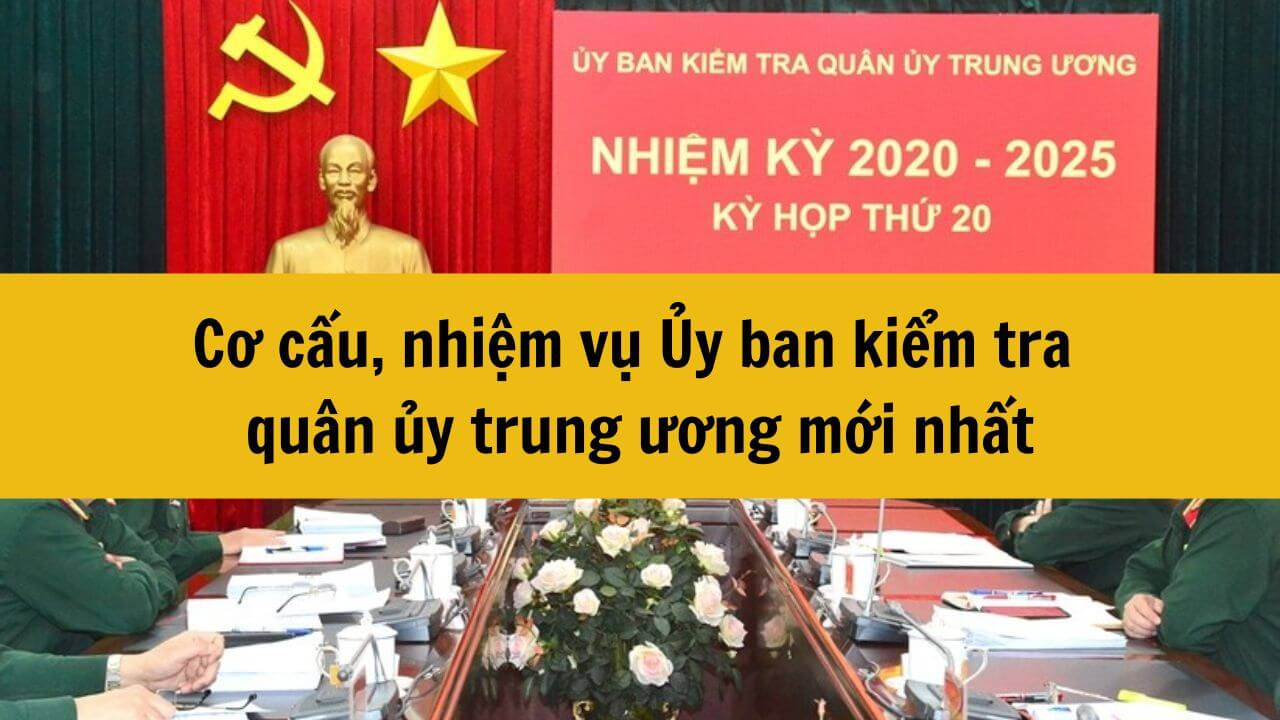
Cơ cấu, nhiệm vụ Ủy ban kiểm tra quân ủy trung ương mới nhất 2025
Ủy ban Kiểm tra Quân ủy Trung ương đóng vai trò quan trọng trong việc bảo đảm kỷ luật, kiểm soát và nâng cao hiệu quả hoạt động của lực lượng vũ trang nhân dân Việt Nam. Năm 2025, trong bối cảnh đất nước đối mặt với nhiều thách thức mới, cơ cấu và nhiệm vụ của Ủy ban này càng trở nên cần thiết và cấp bách hơn bao giờ hết. Vậy hiện nay, pháp luật quy định ra sao về cơ cấu, nhiệm vụ Ủy ban kiểm tra quân ủy trung ương? 21/11/2024Nhiệm vụ, quyền hạn Cục Điều tra hình sự Quân đội nhân dân Việt Nam mới nhất 2025

Nhiệm vụ, quyền hạn Cục Điều tra hình sự Quân đội nhân dân Việt Nam mới nhất 2025
Trong bối cảnh an ninh quốc gia và trật tự xã hội ngày càng phức tạp, Cục Điều tra hình sự Quân đội nhân dân Việt Nam đóng vai trò quan trọng trong việc bảo vệ và thực thi pháp luật. Bài viết này sẽ đi sâu vào các nhiệm vụ và quyền hạn của Cục Điều tra hình sự theo quy định pháp luật hiện hành, từ đó làm rõ vai trò của đơn vị trong việc bảo vệ tổ quốc và xây dựng một lực lượng vũ trang tinh nhuệ, hiệu quả. 21/11/2024Cơ cấu tổ chức, nhiệm vụ quyền hạn Viện kiểm sát quân sự trung ương mới nhất 2025

Cơ cấu tổ chức, nhiệm vụ quyền hạn Viện kiểm sát quân sự trung ương mới nhất 2025
Trong bối cảnh quốc phòng và an ninh ngày càng được chú trọng, vai trò của Viện kiểm sát quân sự Trung ương trở nên ngày càng quan trọng trong việc bảo đảm sự tuân thủ pháp luật và bảo vệ quyền lợi của nhà nước, tổ chức và cá nhân. Năm 2025, quy định về cơ cấu tổ chức, nhiệm vụ và quyền hạn của Viện kiểm sát quân sự Trung ương đã và đang ngày càng được hoàn thiện, nhằm đáp ứng yêu cầu nhiệm vụ trong tình hình mới. 21/11/2024Cơ cấu tổ chức, nhiệm vụ quyền hạn Tòa án quân sự khu vực mới nhất 2025
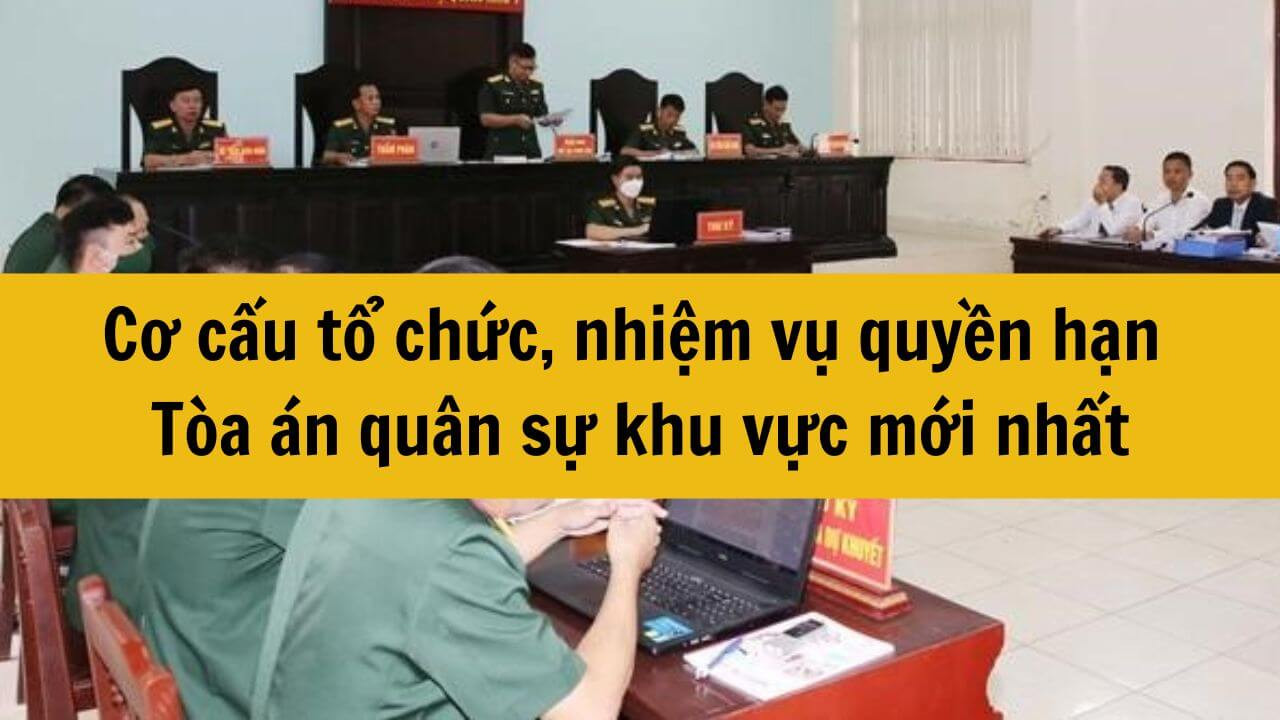
Cơ cấu tổ chức, nhiệm vụ quyền hạn Tòa án quân sự khu vực mới nhất 2025
Năm 2025 các quy định mới nhất về Tòa án quân sự nói chung và Tòa án quân sự khu vực nói riêng đã và đang ngày càng được hoàn thiện nhằm nâng cao hiệu quả hoạt động và đảm bảo quyền lợi chính đáng cho các quân nhân cũng như cán bộ, chiến sĩ. Vậy hiện nay, nhiệm vụ, quyền hạn, cơ cấu tổ chức của Tòa án quân sự khu vực được quy định ra sao? 21/11/2024Cơ cấu tổ chức, nhiệm vụ quyền hạn Tòa án quân sự quân khu mới nhất 2025
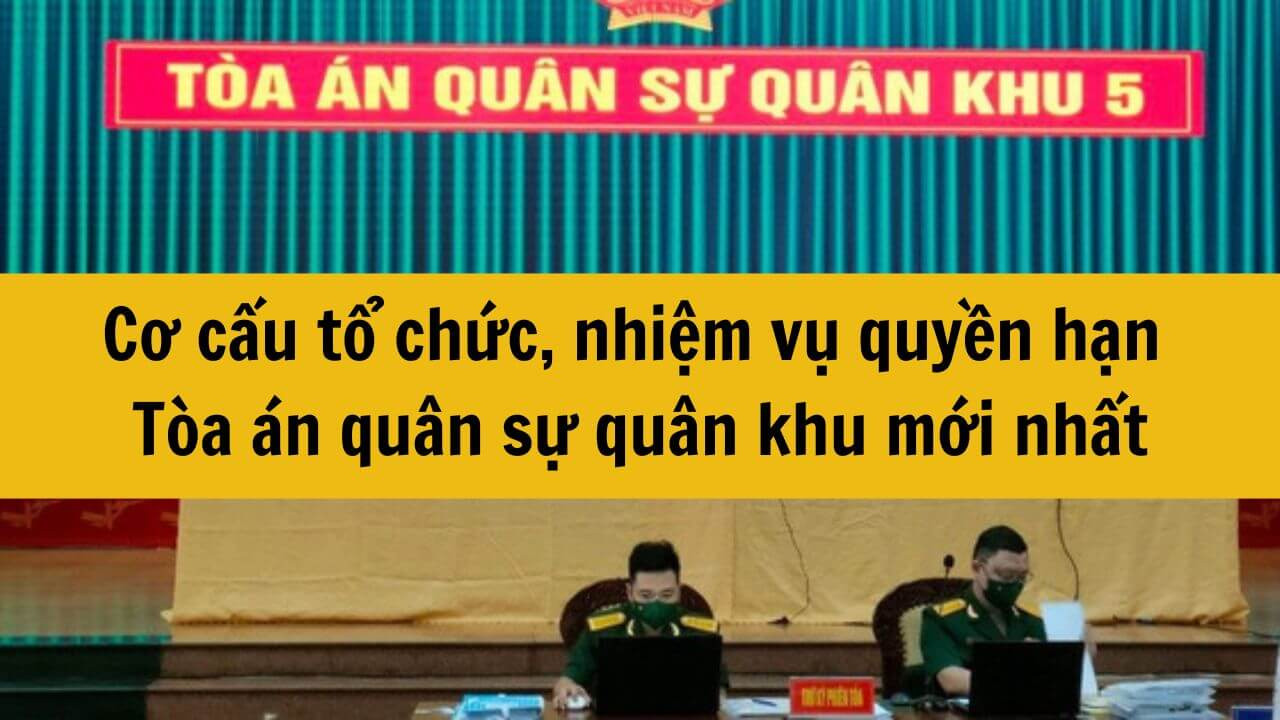
Cơ cấu tổ chức, nhiệm vụ quyền hạn Tòa án quân sự quân khu mới nhất 2025
Trong bối cảnh hiện nay, việc cải cách hệ thống tư pháp quân sự đóng vai trò quan trọng trong việc bảo vệ pháp luật và trật tự xã hội. Hiện nay, bộ máy Tòa án quân sự đang ngày càng được hoàn thiện, trong đó Tòa án quân sự quân khu đóng vai trò quan trọng. Hiện nay pháp luật quy định ra sao về nhiệm vụ, hoạt động, cơ cấu tổ chức của Tòa án quân sự quân khu? 21/11/2024Cơ cấu tổ chức, nhiệm vụ quyền hạn Tòa án quân sự trung ương mới nhất 2025
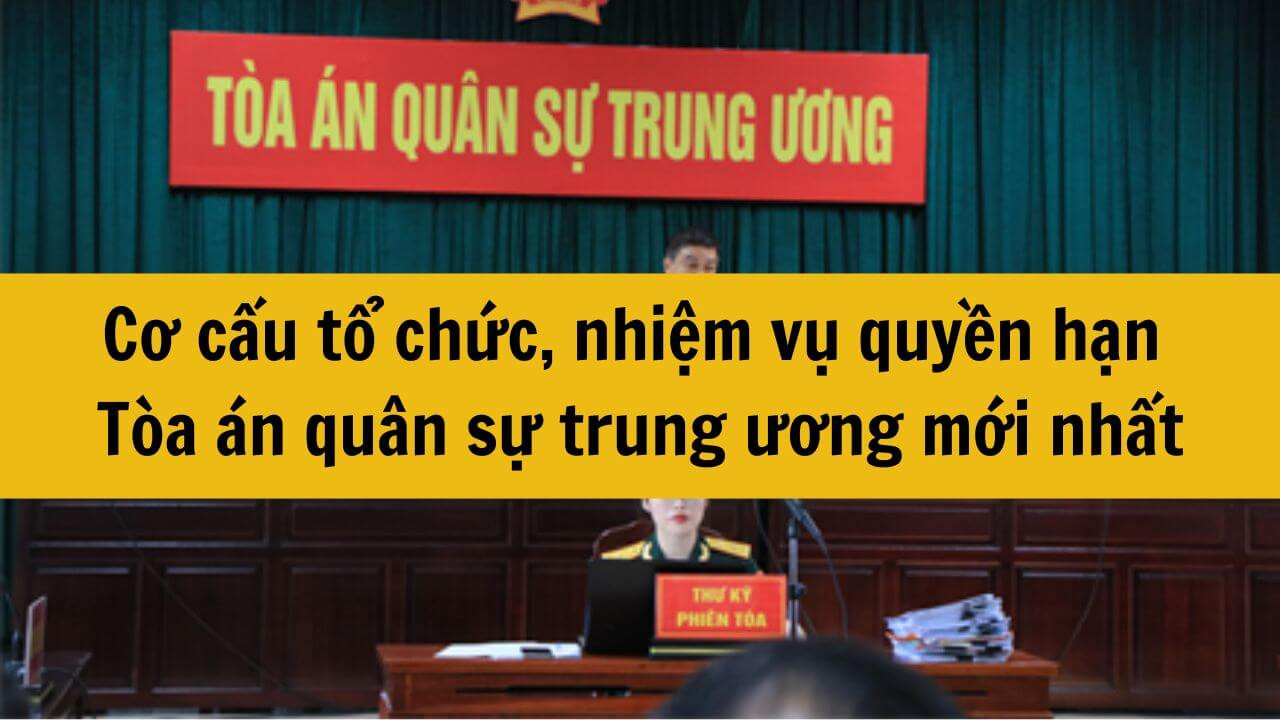
Cơ cấu tổ chức, nhiệm vụ quyền hạn Tòa án quân sự trung ương mới nhất 2025
Trong bối cảnh an ninh quốc gia ngày càng trở nên phức tạp, việc cải cách hệ thống tư pháp quân sự đóng vai trò quan trọng trong việc bảo vệ pháp luật và trật tự xã hội. Hiện nay, bộ máy Tòa án quân sự đang ngày càng được hoàn thiện, trong đó đứng đầu là Tòa án quân sự trung ương. Vậy hiện nay pháp luật quy định ra sao về nhiệm vụ, hoạt động, cơ cấu tổ chức của Tòa án quân sự trung ương? 21/11/2024Quy định mới nhất 2025 về Tòa án quân sự
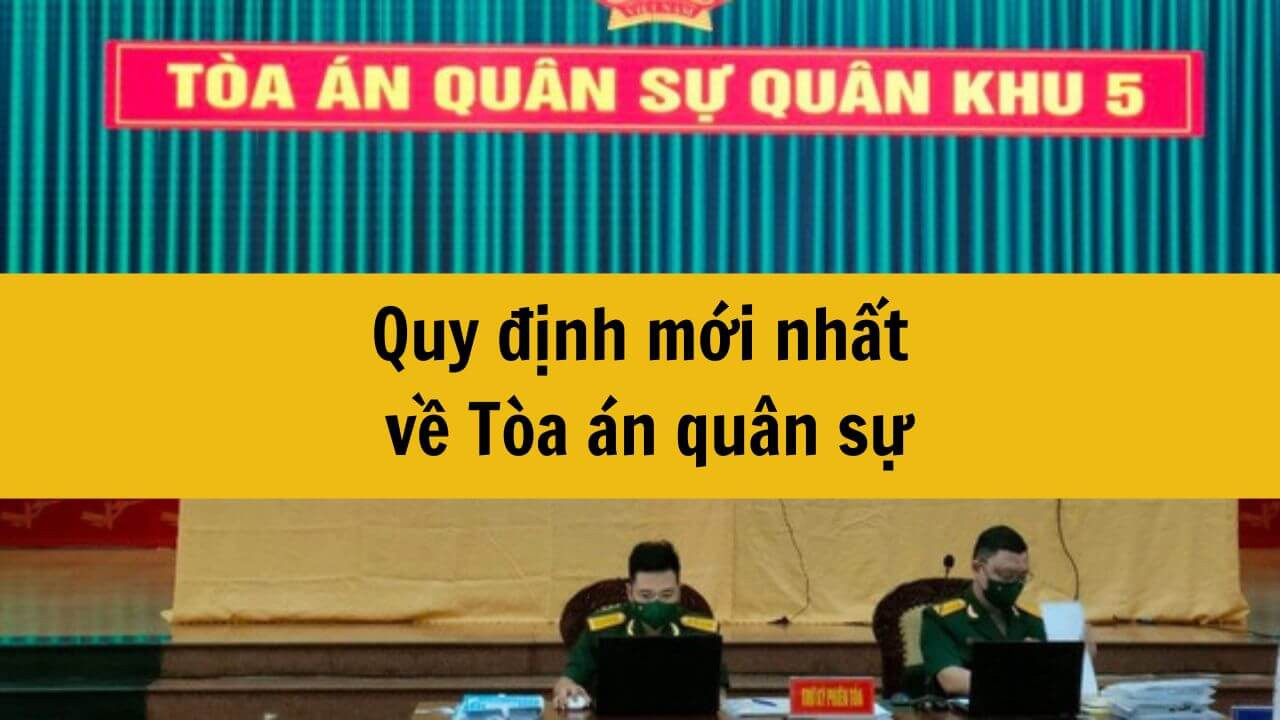
Quy định mới nhất 2025 về Tòa án quân sự
Trong bối cảnh an ninh quốc gia ngày càng trở nên phức tạp, việc cải cách hệ thống tư pháp quân sự đóng vai trò quan trọng trong việc bảo vệ pháp luật và trật tự xã hội. Năm 2025 các quy định mới nhất về Tòa án quân sự đã và đang ngày càng được hoàn thiện nhằm nâng cao hiệu quả hoạt động và đảm bảo quyền lợi chính đáng cho các quân nhân cũng như cán bộ, chiến sĩ. 21/11/2024Những ngành nghề cần có bằng cử nhân Luật

Những ngành nghề cần có bằng cử nhân Luật
Bằng cử nhân luật mở ra rất nhiều cơ hội nghề nghiệp đa dạng và hấp dẫn. Với kiến thức chuyên sâu về pháp luật, người tốt nghiệp ngành luật có thể lựa chọn làm việc tại nhiều lĩnh vực khác nhau. Dưới đây là một số ngành nghề phổ biến mà bạn có thể tham khảo. 06/11/2024Civil Law là gì? Việt Nam theo hệ thống pháp luật nào? Common Law hay Civil Law?
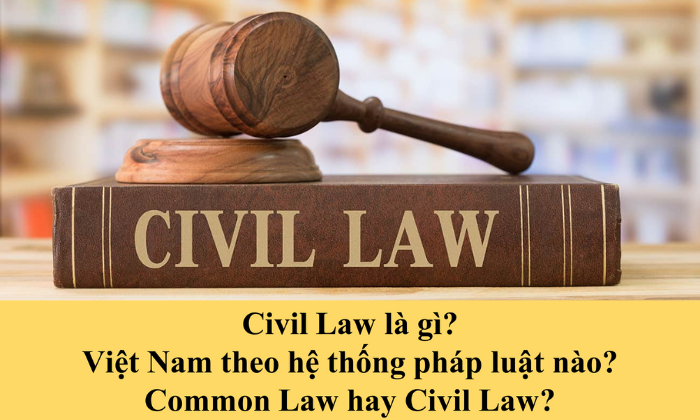
Civil Law là gì? Việt Nam theo hệ thống pháp luật nào? Common Law hay Civil Law?
Civil Law là gì? Việt Nam theo hệ thống pháp luật nào? Common Law hay Civil Law? 04/11/2024Văn bản quy phạm pháp luật là gì?


 Luật tổ chức Toà án nhân dân 2014 (Bản Word)
Luật tổ chức Toà án nhân dân 2014 (Bản Word)
 Luật tổ chức Toà án nhân dân 2014 (Bản Pdf)
Luật tổ chức Toà án nhân dân 2014 (Bản Pdf)